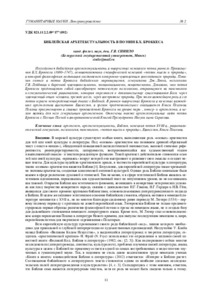Please use this identifier to cite or link to this item:
https://elib.psu.by/handle/123456789/23409| Title: | Библейская архетекстуальность в поэзии Б.Х. Броккеса |
| Authors: | Синило, Г. В. |
| Issue Date: | 2019 |
| Publisher: | Полоцкий государственный университет |
| Citation: | Вестник Полоцкого государственного университета. Серия A, Гуманитарные науки. - 2019. - № 2 – C. 11-21. |
| Abstract: | Исследуется библейская архетекстуальность в творчестве немецкого поэта раннего Просвещения Б.Х. Броккеса (1680–1747), основоположника специфической немецкой «поэзии мысли и природы», в которой философская медитация соединяется конкретно-чувственным воссозданием природы. Показан синтез в поэзии Броккеса библейского мироощущения, сенсуализма Дж. Локка, телеологии Г.В. Лейбница и барочной чувствительности, эмоциональности, живописности. Доказано, что поэзия Броккеса представляет собой своеобразную поэтическую телеологию, опирающуюся на панентеизм и сенсуалистический рационализм, которая стремится к доказательству существования Бога через чувственный опыт человека, прежде всего, через восприятие природы. При этом важнейшую роль в его поэзии играет непосредственный диалог с Библией. В раннем творчестве Броккеса в качестве важнейших архетекстов выступают Евангелия, в зрелом предпочтительнее оказывается Книга Псалмов. Псалмы присутствуют в главных произведениях Броккеса на уровне пара- , интер- и архетекста, в целом являясь для него генеральным архетекстом. Отмечены также архетекстуальные связи поэзии Броккеса с Песнью Песней и второканонической Книгой Премудрости Иисуса сына Сирахова.= In this research paper is investigates Biblical archetextuality in the works of B. H. Brockes (1680–1747). B.H. Brockes became the founder of a specific German “poetry of thought and nature” (Gedanken- und Naturlyrik), in which philosophical meditation is connected with concretely-sensual replication of nature. We show in Brockes’s poetry the synthesis of biblical attitude, J. Lock’s sensualism, G.W. Leibnitz’s theleology and baroque sensibility, emotionality and picturesqueness. We prove that B. H. Brockes’s poetry is a peculiar poetic theleology being based on panentheism and sensualistic rationalism, attempting to demonstrate the existence of God through sensual experience of a human, first of all through perception of nature. In so doing, the direct dialogue with the Bible plays the main role in his poetry. The Gospels are the most important archetexts in the early works of Brockes, then The Book of Psalms becomes more preferable in the middle. Psalms are present on the level of para-, inter- and architext in the main works of Brockes, being on the whole the general archetext for it. We also mark the archetextual connections of Brockes’s poetry with the Song of Solomon and the deuterocanonical Wisdom of Sirach. Above all, the poet chooses the fragments including descriptions of nature and reflections on harmonic structure of the universe created by God. |
| Keywords: | Государственный рубрикатор НТИ - ВИНИТИ::ОБЩЕСТВЕННЫЕ НАУКИ::Литература. Литературоведение. Устное народное творчество Архетекст Архетекстуальность Библия Немецкая поэзия XVIII в. Рационалистический сенсуализм Телеология Панентеизм «Поэзия мысли и природы» Евангелия Книга Псалмов Archetext Archetextuality The Bible German poetry of the XVIII century Rational sensualism Theleology Panentheism “The poetry of thought and nature” (Gedanken- und Naturlyrik) The Gospels The Book of Psalms |
| URI: | https://elib.psu.by/handle/123456789/23409 |
| metadata.dc.rights: | open access |
| Appears in Collections: | 2019, № 2 |
Items in DSpace are protected by copyright, with all rights reserved, unless otherwise indicated.
